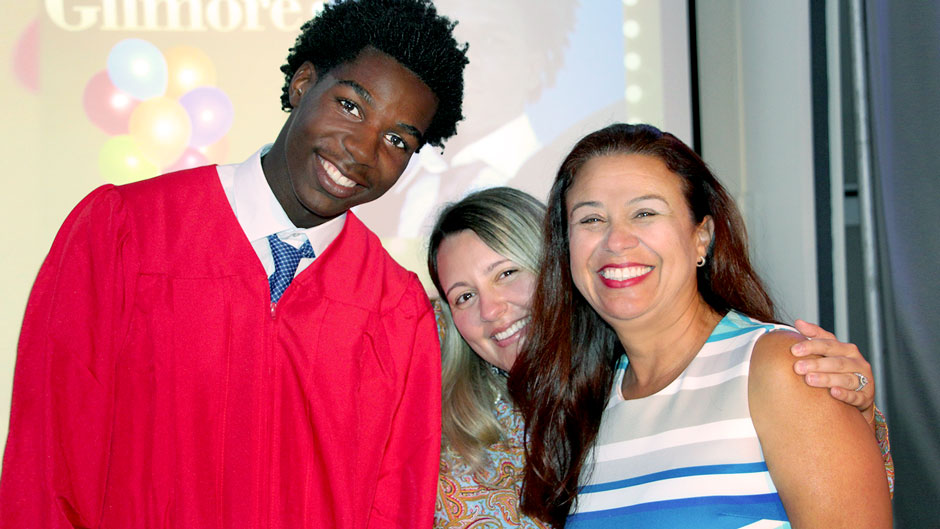A contingent of University of Miami students, alumni, and faculty—many of whom served as mentors, lead teachers, and program staff for the past four years—were on hand to cheer on 17 graduates of the first cohort of the First Star Academy, all of whom persevered through the rigorous college preparatory program that includes residential summer learning and regular Saturday meetings with program staff through the school year.
The ceremony was held at the nonprofit BLUE Missions, near the Coral Gables Campus.
Kele Stewart, law professor and associate dean for experiential learning at the School of Law, congratulated the students, many of whom are the first in their families to graduate high school, on their perseverance.
“We have believed in you from the start, but what’s important is that you have come to believe in yourself,” said Stewart. “It’s so heart-warming, and I’m so incredibly proud to know every one of you amazing students. I know each of their superpowers.”
The School of Education and Human Development and the School of Law spearheaded the academy’s launch at the University in 2017, welcoming a cohort of students—9th-graders at the time—for their first month-long summer residential stay on campus. Seventeen of the original 21 students graduated, and several who already began their university studies connected remotely to the ceremony.
The on-campus summer residential program is the cornerstone of an effort geared to help teens involved with the child welfare system transition successfully to higher education and adulthood. Students live in residence halls and attend daily academic and life-skills classes. The program also includes field trips to local businesses, cultural destinations, and social activities.
Ambar Alfaro, a 2004 alumna of the University who double majored in print journalism and English literature and now teaches at Southwest Miami Senior High School, spent the past four summers as the lead reading and language arts teacher for the program. Her Southwest colleague Carlos Chirino taught math, and both were introduced to First Star by Maria Pia De Castro, who as program director serves as teacher, administrator, and social worker.
“There were first-summer growing pains for sure—I really had to work to get to know the students and connect with them,” said Alfaro. “But they saw that we kept coming back and that we were in it for them. They weren’t about to be absorbed until they came to know that we cared, and these kids can smell a phony.”
“It’s just amazing to see how they’ve grown—and I don’t mean just physically—because now they have plans, goals, and dreams and it’s wonderful to know that we were part of that,” she added.
Kayla Mason, a 2021 graduate of the University, and Ceon Wong, an engineering major, have served as mentors since the program’s inception. Mentors teach entrepreneurial skills, tutor academics, and provide life coaching.
“I’ve always had an affinity for kids in the foster system—I knew how broken and messed up it was,” said Mason, the winner of the “All-Star Mentor” award whose family at one point slipped into homelessness and had to rely on support from relatives.
As a first-year student, Mason, who this summer will begin doctoral studies in microbiology in North Carolina, had worked at the Office of Academic Enhancement when she learned about the program and applied to become a mentor. “The biggest thing through all this was to be consistent for the students,” she said. “I wouldn’t miss the chance to celebrate this milestone in their journey.”
Wong is considering a study program in Gainesville this summer and is still undecided if he’ll continue as a mentor when the next cohort arrives. He also had worked with children before and relished the opportunity to get to know the youth and to help them learn important life and study skills.
Because of the pandemic, students had to forego their summer residence last summer and instead connected remotely for their learning sessions. Their regular academic lessons were supplemented with instruction from University educators such as Rick Toren, entrepreneur-in-residence in management with the Miami Herbert Business School, who volunteered and created a curriculum on entrepreneurialism, and Wifredo “Wifi” Fernandez, who recently earned his J.D. from the School of Law. Fernandez shared his business experiences with the teens in the entrepreneurial module.
The School of Law’s Children and Youth Law Clinic and the School of Education and Human Development are involved in all aspects of program design and implementation, with involvement by faculty and students in both schools.
Community organizations such as Educate Tomorrow and small family foundations such as that of Carlos and Rosita de la Torre provide valuable resources and support that help to fill in the many gaps for the students.
This summer, the program partnered with T-ROC Global and One Laptop Per Child and will provide 25 laptops to the students attending the summer session on campus. The program will include a special component on restorative justice, according to Stewart.
Kaitlyn Casanas, who earned her bachelor’s in education from the University in 2018, served this past year as the program’s assistant director.
“What stands out for me is that no matter the life struggles—and so many of these students have been so marginalized and had to overcome so much—there’s always a light at the end of the tunnel,” Casanas said. “They have learned to accept the help offered them and been able to graduate high school. They’re incredibly capable of so much.”

